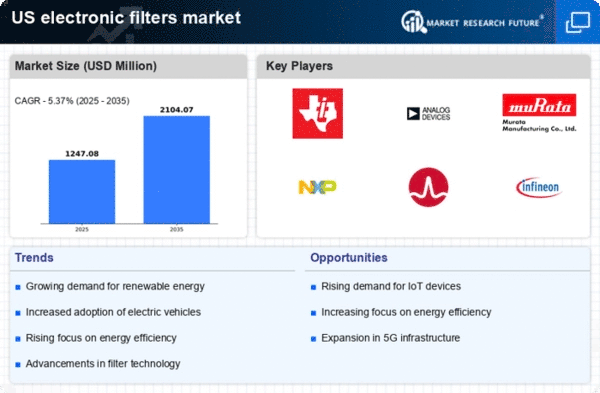Increased Regulatory Standards
The electronic filters market is influenced by the implementation of stringent regulatory standards aimed at improving product quality and safety. In the US, regulatory bodies are establishing guidelines that necessitate the use of high-performance electronic filters in various applications, including telecommunications and industrial equipment. These regulations are designed to minimize electromagnetic interference and enhance overall system reliability. As a result, manufacturers are compelled to invest in advanced filtering technologies to comply with these standards, thereby driving growth in the electronic filters market. the anticipated increase in compliance costs may also lead to a consolidation of suppliers. This will further shape the competitive landscape..
Growth in Renewable Energy Sector
the shift towards renewable energy sources is creating new opportunities. This is particularly true for the electronic filters market.. As the US invests heavily in solar and wind energy, the demand for electronic filters in power conversion systems is likely to increase. These filters play a crucial role in ensuring the efficiency and stability of energy systems by mitigating harmonics and noise. In 2025, the renewable energy market in the US is projected to reach $200 billion, with a significant portion of this growth attributed to the need for reliable electronic filtering solutions. This trend indicates a favorable environment for the electronic filters market, as stakeholders seek to optimize energy production and distribution.
Rising Consumer Electronics Demand
The electronic filters market is experiencing a notable surge in demand driven by the increasing consumption of consumer electronics. As households and individuals invest in smart devices, the need for high-quality electronic filters becomes paramount to ensure optimal performance and longevity. In 2025, the consumer electronics sector in the US is projected to reach approximately $400 billion. A significant portion is allocated to devices requiring advanced filtering solutions.. This trend indicates a robust growth trajectory for the electronic filters market, as manufacturers strive to meet the evolving needs of consumers who prioritize quality and reliability in their electronic devices.
Expansion of Automotive Electronics
The automotive industry is undergoing a transformation with the integration of advanced electronic systems, which is positively impacting the electronic filters market. As vehicles become increasingly equipped with sophisticated infotainment systems, navigation tools, and safety features, the demand for effective electronic filters is likely to rise. In 2025, the automotive electronics market in the US is expected to exceed $100 billion. A substantial share is dedicated to filtering solutions that enhance signal integrity and reduce noise.. This expansion suggests a promising outlook for the electronic filters market, as automotive manufacturers seek to improve the performance and reliability of their electronic components.
Advancements in Communication Technologies
the rapid evolution of communication technologies is significantly impacting the electronic filters market. This is especially true with the rollout of 5G networks.. With the rollout of 5G networks and the increasing reliance on high-speed data transmission, the demand for advanced filtering solutions is expected to rise. Electronic filters are essential for managing signal integrity and reducing interference in communication systems. The telecommunications sector in the US is projected to grow to $500 billion by 2025, with a substantial investment in infrastructure that necessitates high-performance electronic filters. This growth trajectory suggests a robust future for the electronic filters market, as companies strive to enhance their communication capabilities.














